四川岳池第一中学七年级英语下册《Module 2 What can you do?第5课时 Unit 3 Language in use》学案外研版
七年级下册Module2WhatcanyoudoModule2Whatcanyoudo

Module 2 What can you do ?Unit 1 I can play the piano .一、教学目标1、掌握本单元的短语及重要句子。
2、掌握并正确应用情态动词can。
3、能描述自己的特长及想加入的俱乐部。
4、发展自己特长,做全面发展的优秀生。
二、教材分析本模块共三个单元, Unit one I can play the piano .主要学习有关运动的单词和情态动词can 的用法。
Unit two I can run really fast.通过竞聘班里的学习班长,卫生班长,体育班长介绍自己能干的事情和推选的理由。
Unit three Language in use 总结巩固情态动词can的用法及其肯定、疑问与否定形式及相关练习题。
三.教学重点学习询问和谈论彼此的能力和特长语法重点情态动词can的使用四、教学过程[课前朗读] 跟录音朗读单词play tennis piano ride club term board would like well all worry teach then 牢固地形成正确语音,注意读词时先看音标再看单词,让学生逐渐养成音、形结合背单词的习惯。
[检测]:a.小组内只看音标朗读单词,组长注意订正不正确的发音。
利用图片完成短语的翻译:唱歌弹钢琴骑自行车跳舞说英语打乒乓球做饭(并写在作业本上)(一)、情境导入1问学生:What can you do?以此来引导学生,叙述自己能干的事情,引发学生的兴趣,调动学生的思维,导入本课。
练习句型:—— What can you do?——I can play basketball .(二)、小听力(自主完成,合作释疑)Look at the pictures . Listen and check (√)the things which Tony’s dad can do .(三)、多层听1. Listen and answer the questions .(1)Which club can Daming Betty Tony join ?2. 再听activity3,填写表格,完成后小组内交流答案。
七年级英语下册《Module 2 What can you do Unit 1 I can play the piano.》教案

Module 2 What can you do?一、学习目标:A. 单词和短语:play, tennis, piano, ride, club, term, board, would like, well, all, that’s all, worry, worry about, teach, then, monitor, start, get onB. 交际用语:C. 教学目标1.Function:Finding outwhatpeople can do; asking and answering about abilities2. Structure: can / can’t3. Skills: 1) Listening and finding out about people’s abilities.2) Supplying information on people’s abilities.3) Reading and understanding simple passages, finding specific information4) Composing a simple passage4. Around the world: Languages5. Task: Making a poster for a club.二、重点及难点: 情态动词can / can’t的用法三、教学设计:Unit 1 I can play the piano.ⅠTeaching model Listening and speakingⅡTeaching method Bottom-up approach to listeningⅢTeaching aims To understand the using can and can’t.ⅣTeaching Objectives1. Key vocabulary: play, tennis, piano, ride, club, term, board, would like, well, all,that’s all, worry, worry about, teach, then2. Key structures: 1) I can …. 2) I can’t …. 3) —Can you …? —Yes, I can. / No,I can’t.ⅤTeaching aids Tape recorder, OHP, videoⅥTeaching StepsStep 1 W arming-up1. Show some pictures and say what they are.2. Read the words after the teacher.3. Introduce the new words.4. Ask the students to read through the words and expressions in Activity 1.5. Look at the pictures carefully.6. Match the words and expressions from the box with the pictures.7. Check their answer with a partner. 8. Call back the answer from the whole classand check the answer.Step 2 Listening practice1. Ask the students to pictures in Activity2.2. Listen and check (√)the things in Activity 1 which Tony’s dad can do.3. Play the recording again, then they can check their answer with a partner.4. Call back the answer from the whole class and check the answer.Step 3 Listen and read.1. Ask the students to read the conversation silently.2. Play the rec ording and ask the students to listen and read the conversation.3. Read the conversation.4. Act it out.5. Ask the students to check (√) the clubs they want to join.6. Ask the students to check with a partner.7. Play the recording again .Check the answers:ClubName Music Club Dance Club TableTennis ClubFood andDrink ClubDaming √Betty √Lingling √Tony √Step 4 Complete the passage.1. Ask the students to read the words in the box in Activity 4.2. Read through the passage.Can you cook? No? Join the Food and Drink (1) __________. Can you play the piano? Join the (2) __________ Club. What about dancing? (3) __________ the Dance Club. The re are lots of new clubs ever y (4) __________. They’re all on the (5) __________ and you can choose your favourite.3. Complete the passage with the correct form of the words from the box.4. Ask the students to check with a partner.5. Check the answers:6. Learn “Everyday English”Step 5 Pronunciation and speaking.1. Say the sent ences in Activity 5 aloud./kən/ I can play piano. /ka:nt/ I can’t speak Chinese very well. /kæn/ Can you cook?2. Listen and repeat.3. Learning to learnIn English, we pronounce a word in different ways when it is stressed or not stressed.In “Yes, I can”, we pronounce can as /kæn/; in “Oh, goo d. You can come to help us”, we pronounce can as /kən/.4. Play the recording once without stopping.5. Listen and repeat in Activity6.Step 6 Guessing game.1. Show some pict ures.2. According to the information given and ask the students to guess what it is.3. Show the pictures to check the answers.Step 7 Work in pairs.1. Look at the information.Can Can’tDaming speak Chinese play the piano danceBetty speak English cook play table tennisLinglispeak Chinese dance cookngspeak Chinese well Tony play table tennis speakEnglish2. Read through the example with the class.—Can Betty speak English? —Yes, she can.—Can Tony speak Chinese well? —No, he can’t.3. Pair them to ask and answer.4. Circulate and monitor their production.Step 8 Do exercises:Step 9 HomeworkRemember the words of Unit 1 and prepare the text of Unit 2.。
七年级英语下册Module2Whatcanyoudo?第4课时Unit2Icanrunreallyf
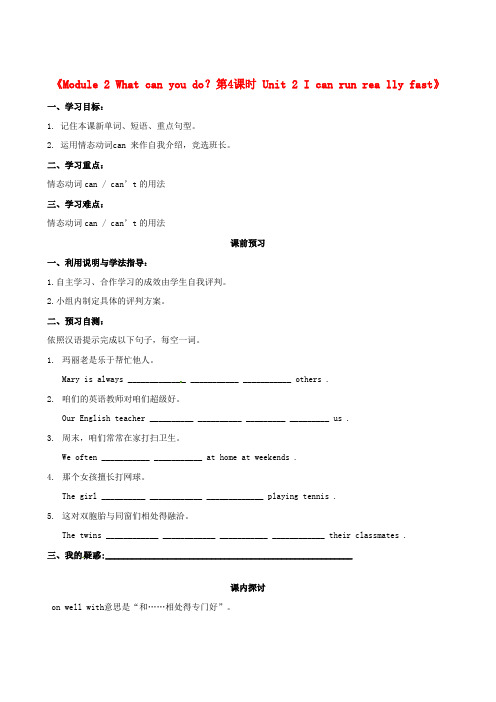
《Module 2 What can you do?第4课时 Unit 2 I can run rea lly fast》一、学习目标:1. 记住本课新单词、短语、重点句型。
2. 运用情态动词can 来作自我介绍,竞选班长。
二、学习重点:情态动词can / can’t的用法三、学习难点:情态动词can / can’t的用法课前预习一、利用说明与学法指导:1.自主学习、合作学习的成效由学生自我评判。
2.小组内制定具体的评判方案。
二、预习自测:依照汉语提示完成以下句子,每空一词。
1.玛丽老是乐于帮忙他人。
Mary is always _____________ ___________ ___________ others .2.咱们的英语教师对咱们超级好。
Our English teacher __________ __________ _________ _________ us .3.周末,咱们常常在家打扫卫生。
We often ___________ ___________ at home at weekends .4.那个女孩擅长打网球。
The girl __________ ____________ _____________ playing tennis .5.这对双胞胎与同窗们相处得融洽。
The twins ____________ ____________ ___________ ____________ their classmates .三、我的疑惑:________________________________________________________课内探讨on well with意思是“和……相处得专门好”。
work very hard, and I do well at school.我在学校学习尽力,表现专门好。
do well意思是“表现好”。
do well in 是指“在某方面做得好,擅长做……”。
四川省岳池县第一中学七年级英语下册《Module 2 What can you do?第2课时 Unit 1 I can play the piano》
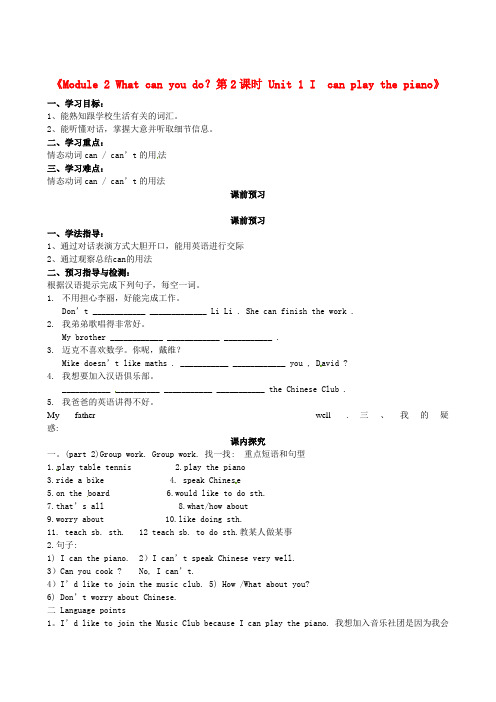
《Module 2 What can you do?第2课时 Unit 1 I can play the piano》一、学习目标:1、能熟知跟学校生活有关的词汇。
2、能听懂对话,掌握大意并听取细节信息。
二、学习重点:情态动词can / can’t的用法三、学习难点:情态动词can / can’t的用法课前预习课前预习一、学法指导:1、通过对话表演方式大胆开口,能用英语进行交际2、通过观察总结can的用法二、预习指导与检测:根据汉语提示完成下列句子,每空一词。
1.不用担心李丽,好能完成工作。
Don’t ____________ _____________ Li Li . She can finish the work .2.我弟弟歌唱得非常好。
My brother ____________ ____________ ___________ .3.迈克不喜欢数学。
你呢,戴维?Mike doesn’t like maths . ___________ ____________ you , D avid ?4.我想要加入汉语俱乐部。
___________ __________ ___________ ___________ the Chinese Club .5.我爸爸的英语讲得不好。
My father ___________ ____________ _____________ well .三、我的疑惑:________________________________________________________课内探究一。
(part 2)Group work. Group work. 找一找: 重点短语和句型1.play table tennis2.play the piano3.ride a bike4. speak Chines e5.on the board6.would like to do sth.7.that’s all 8.what/how about9.worry about 10.like doing sth.11. teach sb. sth.12 teach sb. to do sth.教某人做某事2.句子:1) I can the piano. 2)I can’t speak Chinese very well.3)Can you cook ? No, I can’t.4)I’d like to join the music club. 5) How /What about you?6) Don’t worry about Chinese.二 Language points1。
外研版英语七年级下册《Module 2 What can you do Unit1 I can pl
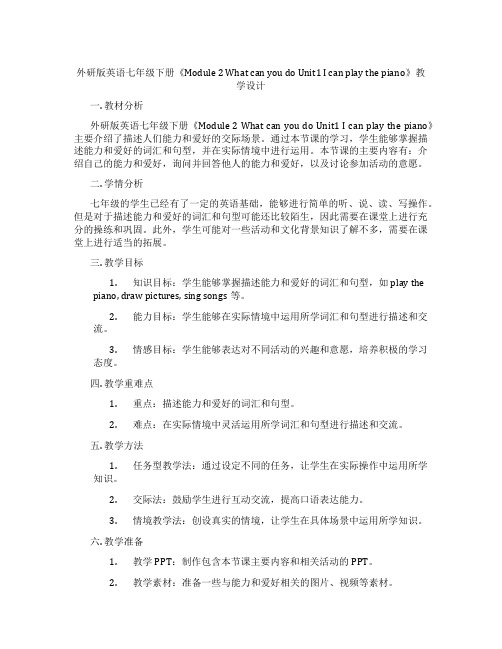
外研版英语七年级下册《Module 2 What can you do Unit1 I can play the piano》教学设计一. 教材分析外研版英语七年级下册《Module 2 What can you do Unit1 I can play the piano》主要介绍了描述人们能力和爱好的交际场景。
通过本节课的学习,学生能够掌握描述能力和爱好的词汇和句型,并在实际情境中进行运用。
本节课的主要内容有:介绍自己的能力和爱好,询问并回答他人的能力和爱好,以及讨论参加活动的意愿。
二. 学情分析七年级的学生已经有了一定的英语基础,能够进行简单的听、说、读、写操作。
但是对于描述能力和爱好的词汇和句型可能还比较陌生,因此需要在课堂上进行充分的操练和巩固。
此外,学生可能对一些活动和文化背景知识了解不多,需要在课堂上进行适当的拓展。
三. 教学目标1.知识目标:学生能够掌握描述能力和爱好的词汇和句型,如play thepiano, draw pictures, sing songs等。
2.能力目标:学生能够在实际情境中运用所学词汇和句型进行描述和交流。
3.情感目标:学生能够表达对不同活动的兴趣和意愿,培养积极的学习态度。
四. 教学重难点1.重点:描述能力和爱好的词汇和句型。
2.难点:在实际情境中灵活运用所学词汇和句型进行描述和交流。
五. 教学方法1.任务型教学法:通过设定不同的任务,让学生在实际操作中运用所学知识。
2.交际法:鼓励学生进行互动交流,提高口语表达能力。
3.情境教学法:创设真实的情境,让学生在具体场景中运用所学知识。
六. 教学准备1.教学PPT:制作包含本节课主要内容和相关活动的PPT。
2.教学素材:准备一些与能力和爱好相关的图片、视频等素材。
3.教学卡片:制作描述能力和爱好的词汇卡片。
七. 教学过程1.导入(5分钟)利用音乐或视频导入,引起学生对能力和爱好的兴趣。
例如,播放一段钢琴曲,让学生猜测演奏者是谁,引发学生对乐器和音乐的讨论。
四川省七年级英语下册Moudle 2 What can you do Unit
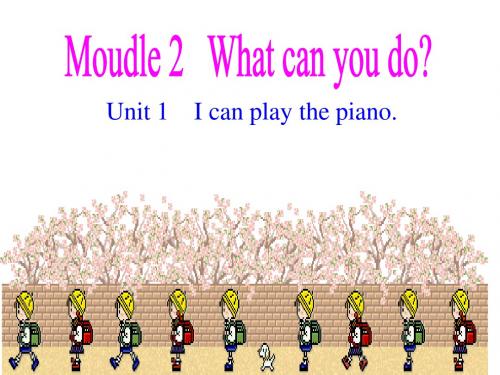
Betty
√
Lingling
√
Tony
√
Read the passage
Language points
(You can ask for help)
Complete the passage
board choose club music tห้องสมุดไป่ตู้rm
Can you cook? No? Join the Food and Drink (1) Club Can
bike
ride a bike
tennis
play tennis
Match
cook 4 dance 1 play table tennis 7 play the piano 2 ride a bike 6 sing 5 speak Chinese 3
dance
I can dance
Can you dance? Yes, I can. No, I can’t.
Survey
run swim dance cook sing play the piano ride a bike play tennis
He Yue Du Jia Lu Bin Wu Yun
A: What can you do? B: I can … A: Can you…? B: Yes, I can. /No, I can’t.
Sing a song
Can you dance? Can you dance? Yes, I can. Yes, I can. Can you ride a bike? Can you ride a bike? No, I can’t . No, I can’t .
Write something about your family using words we’ve learned today.
四川省岳池县第一中学七年级英语下册《Module 2 What can you do?第5课时 Un
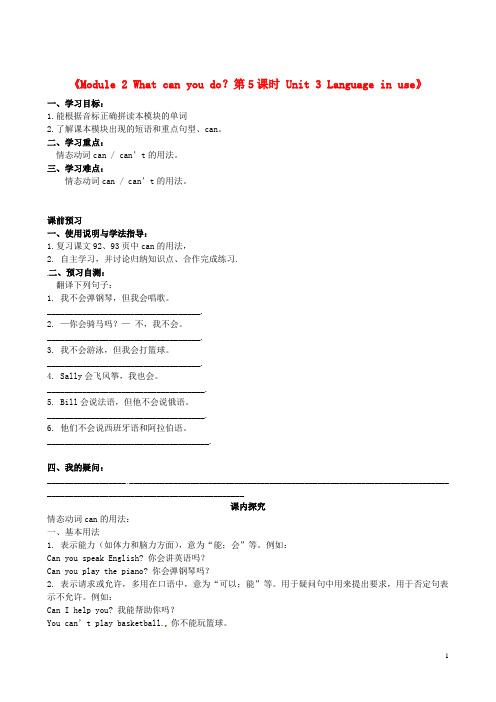
《Module 2 What can you do?第5课时 Unit 3 Language in use》一、学习目标:1.能根据音标正确拼读本模块的单词2.了解课本模块出现的短语和重点句型、can。
二、学习重点:情态动词can / can’t的用法。
三、学习难点:情态动词can / can’t的用法。
课前预习一、使用说明与学法指导:1.复习课文92、93页中can的用法,2. 自主学习,并讨论归纳知识点、合作完成练习.二、预习自测:翻译下列句子:1. 我不会弹钢琴,但我会唱歌。
___________________________________.2. —你会骑马吗?—不,我不会。
___________________________________.3. 我不会游泳,但我会打篮球。
___________________________________.4. Sally会飞风筝,我也会。
____________________________________.5. Bill会说法语,但他不会说俄语。
____________________________________.6. 他们不会说西班牙语和阿拉伯语。
_____________________________________.四、我的疑问:___________________________________________________________________________________________ _____________________________________________课内探究情态动词can的用法:一、基本用法1. 表示能力(如体力和脑力方面),意为“能;会”等。
例如:Can you speak English? 你会讲英语吗?Can you play the piano? 你会弹钢琴吗?2. 表示请求或允许,多用在口语中,意为“可以;能”等。
七年级英语下册 Module 2 What can you do My School Club文章素
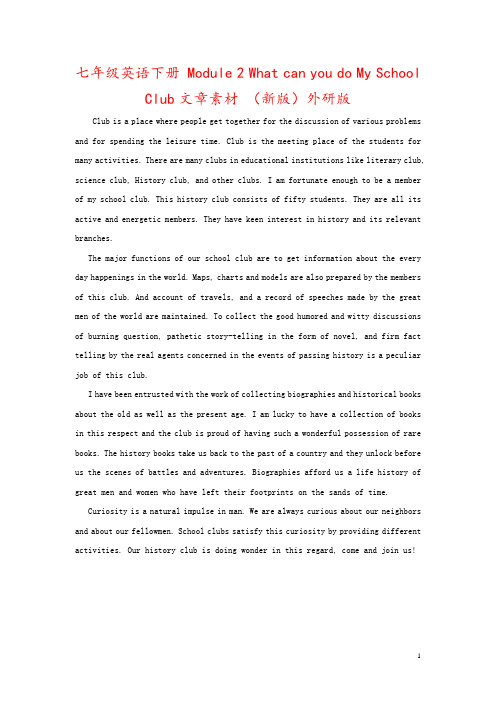
七年级英语下册 Module 2 What can you do My School Club文章素材(新版)外研版Club is a place where people get together for the discussion of various problems and for spending the leisure time. Club is the meeting place of the students for many activities. There are many clubs in educational institutions like literary club, science club, History club, and other clubs. I am fortunate enough to be a member of my school club. This history club consists of fifty students. They are all its active and energetic members. They have keen interest in history and its relevant branches.The major functions of our school club are to get information about the every day happenings in the world. Maps, charts and models are also prepared by the members of this club. And account of travels, and a record of speeches made by the great men of the world are maintained. To collect the good humored and witty discussions of burning question, pathetic story-telling in the form of novel, and firm fact telling by the real agents concerned in the events of passing history is a peculiar job of this club.I have been entrusted with the work of collecting biographies and historical books about the old as well as the present age. I am lucky to have a collection of books in this respect and the club is proud of having such a wonderful possession of rare books. The history books take us back to the past of a country and they unlock before us the scenes of battles and adventures. Biographies afford us a life history of great men and women who have left their footprints on the sands of time.Curiosity is a natural impulse in man. We are always curious about our neighbors and about our fellowmen. School clubs satisfy this curiosity by providing different activities. Our history club is doing wonder in this regard, come and join us!1。
- 1、下载文档前请自行甄别文档内容的完整性,平台不提供额外的编辑、内容补充、找答案等附加服务。
- 2、"仅部分预览"的文档,不可在线预览部分如存在完整性等问题,可反馈申请退款(可完整预览的文档不适用该条件!)。
- 3、如文档侵犯您的权益,请联系客服反馈,我们会尽快为您处理(人工客服工作时间:9:00-18:30)。
《Module 2 What can you do?第5课时 Unit 3 Language in use》
一、学习目标:
1.能根据音标正确拼读本模块的单词
2.了解课本模块出现的短语和重点句型、can。
二、学习重点:
情态动词can / can’t的用法。
三、学习难点:
情态动词can / can’t的用法。
课前预习
一、使用说明与学法指导:
1.复习课文92、93页中can的用法,
2. 自主学习,并讨论归纳知识点、合作完成练习.
二、预习自测:
翻译下列句子:
1. 我不会弹钢琴,但我会唱歌。
___________________________________.
2. —你会骑马吗?—不,我不会。
___________________________________.
3. 我不会游泳,但我会打篮球。
___________________________________.
4. Sally会飞风筝,我也会。
____________________________________.
5. Bill会说法语,但他不会说俄语。
____________________________________.
6. 他们不会说西班牙语和阿拉伯语。
_____________________________________.
四、我的疑问:
___________________________________________________________________________________________ _____________________________________________
课内探究
情态动词can的用法:
一、基本用法
1. 表示能力(如体力和脑力方面),意为“能;会”等。
例如:
Can you speak English? 你会讲英语吗?
Can you play the piano? 你会弹钢琴吗?
2. 表示请求或允许,多用在口语中,意为“可以;能”等。
用于疑问句中用来提出要求,用于否定句表示不允许。
例如:
Can I help you? 我能帮助你吗?
You can’t play basketball.你不能玩篮球。
Can you...?“请你……好吗?”表示说话人的请求;
Can I...?“我可以……吗?”用来征求对方是否允许自己做某事。
如在句末加上 please一词就显得更有礼貌了。
例如:
Can you help me, please? 请你帮助我好吗?
3. 表示可能。
例如:
He can be at home now. 他现在可能在家。
The moon can’t always be full. 月亮不可能常圆。
4. 表示怀疑。
在表达此意时,只能用于一般疑问句中,带有感情色彩。
例如:
Can it be true? 那会是真的吗?
二、句式变化如下:
1. 在变否定句时,直接在can后加上“not”,可缩写成can’t或cannot, 但不能写成cann’t。
例如:He can swim. → He can’t swim.
Tony can see the pen on the desk.→ Tony cannot see the pen on the desk.
2. 在变一般疑问句时,直接移到主语前(原主语的首字母改成小写,第一人称应变为第二人称)即可。
例如:
I can see an orange on the table.
→ Can you see an orange on the tab le?
其回答可用Yes, O K或Certainly等作肯定回答;用No或Sorry等作否定回答。
例如:
—Can you look after my dog, please? 你能照看一下我的狗吗?
—OK. 可以。
用Certainly回答。
此时语气更为肯定。
例如:
—Can I see your piano? 我能看看你的钢琴吗?
—Certainly. 当然可以。
当堂检测:
Ⅰ、单项填空。
1. They ___ do well in the exam.
A. can be able to
B. be able to
C. can able to
D. are able to
2. —May I take this book out?
—No, you _____.
A. needn’t
B. may not
C. aren’t
D. can’t
3. —Can you speak Japanese?
—No, I____.
A. mustn’t
B. can’t
C. needn’t
D. may not
4. —May I take the newspaper away?
—No, you mustn’t. You ____ read it only here.
A. may
B. can
C. must
D. could
5. Man ___ reach the moon or any other star in the universe now, but we ____ get there years ago.
A. can; couldn’t
B. are able to; weren’t able to
C. must; needn’t
D. can; had to
6. “What ____ I do for you?” means “_____ I help you?”
A. can Must
B. shall; Need
C. can; Can
D. will; Shall
7. He ___ do well in the exam.
A. can be able to
B. is able to
C. can able to
D. able to
8. Would you like to go boating with us?
—Yes, ______.
A. I’d like
B. I want
C. I’d like to
D. I do
9. —___ you speak Spanish?
—Yes, I can.
A. can
B. May
C. Must
D. Can
10. ____ you like to have another try?
A. Could
B. Should
C. Would
D. Do
Ⅱ、将下面各组词组成句子
1. ________________________.
(not, he, dance, can)
2. ________________________?
(you, can, see, what )
3. ________________________.
(can, see, not, we, you)
5. _______________.
(I, help, can, you )
6. _______________?
(I, can, do, what)
7. _______________?
(you, hear, can, me)
8. _______________?
(you, can, dance)
三、课后反思:
____________________________________________________________________
课后训练
Ⅰ. 翻译下列句子
1、贝蒂会说英语,但她不会说汉语。
Betty ____ ____ English, ____ she____ speak Chinese.
2、你的朋友会骑马吗?——会。
____ your friends ____ ____ ____ ? Yes , ____ can.
3、那个女孩不会打网球。
The girl ____ ____ tennis.
4、托尼会游泳吗?——不会。
____ Tony ____ ? No , he ____.
5、他们会弹钢琴。
They ____ ____ the _______.
Ⅱ. 单项选择
1、Can you play ____piano?
A、a
B、an
C、the
2、Can you dance? Yes, I ____.
A、do
B、can
C、can’t
3、Can he Write En glish? No,he ____
A、can
B、can’t
C、does
4、I __ ride a bike ,b ut I ____drive a car.
A、can , can
B、can’t , can’t
C、can, can’t
5、S he can _____basketball .
A、play
B、playing
C、plays。
